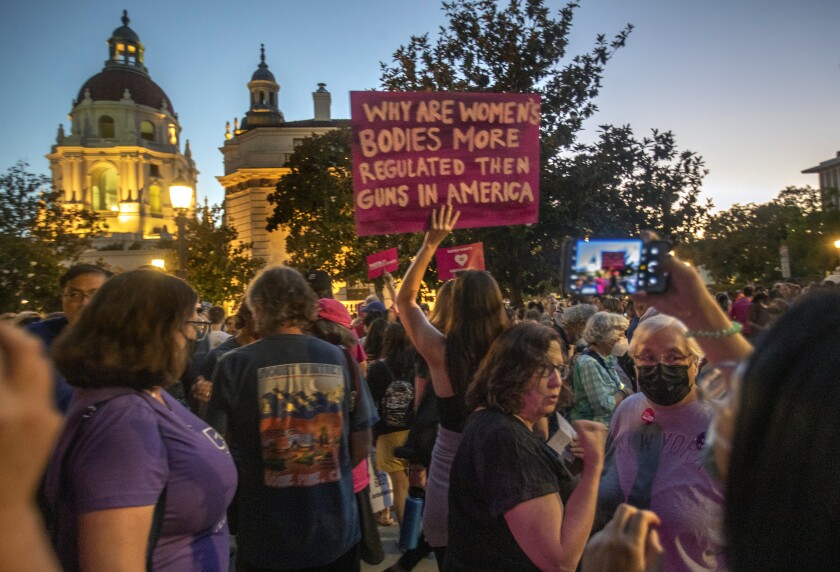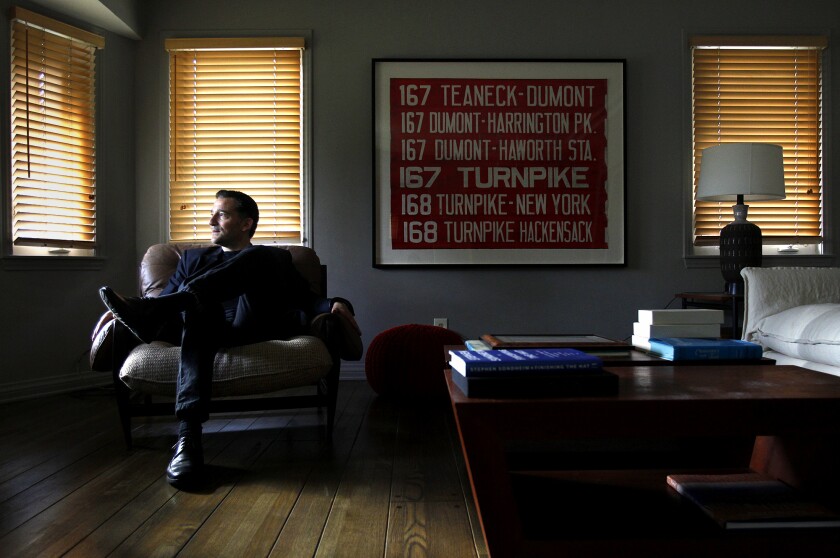Churches across Los Angeles react to the end of Roe vs. Wade

[ad_1]
For Pastor Netz Gómez and the 1,500 members of his Houses of Light church in Northridge, the Supreme Court’s ruling to overturn Roe vs. Wade was an answer to their prayers and decades of hard work.
“We are thanking God that this injustice has finally been rectified, and that states have the right to decide how they want to proceed with abortion rights,” said the pastor, a Mexico native who started the church in his living room 22 years ago and has steadily immersed himself deeper into U.S. politics. “But we are really thanking God because we have prayed so much for the end of abortion. Abortion is injustice. Killing babies is injustice.”
In the past few days, Pastor Gómez has received hundreds of text messages from congregants and friends supporting the court’s decision, and when he spoke about it from the pulpit on Saturday evening, his congregation cheered.
Over the weekend, across Southern California, followers of many different faiths reacted variously with jubilation and sorrow, glee and anger, to the court’s momentous ruling.
On Sunday, 30 miles to the south and east of Houses of Light, Rev. Alfredo Feregrino, associate rector of All Saints Episcopal Church in Pasadena, said that he immediately knew he needed to rewrite his sermon when he learned of the Friday ruling from a flurry of text messages and emails.

People attend a vigil Friday evening at All Saints Episcopal Church in Pasadena with Planned Parenthood Pasadena and San Gabriel Valley.
(Mel Melcon / Los Angeles Times)
The church hosted a vigil Friday night with Planned Parenthood Pasadena and San Gabriel Valley to grieve the loss of the constitutional right, and had hung a red banner declaring “Abortion is Healthcare” outside the church for weeks.
In a sermon Sunday morning inside a chapel adorned with rainbow flags, Feregrino said the decision would have the most severe effects on people living in poverty, those with low incomes, and people with inconsistent access to healthcare. If this decision were truly about protecting babies, he said, there would be “months and months of parental leave for everyone,” free diapers and formula, universal preschool and other support for parents.
The congregation clapped and cried out in assent.
For some among the Christian faithful — particularly many Catholics and evangelicals — the ruling that allows individual states to decide whether and in what circumstances abortions will be legal, if at all, represents a long-hoped for step toward saving precious, unborn life, while for others it’s an incomprehensible attack on women’s fundamental right to decide for themselves what’s best for their lives and their families.
And for some on either side of the debate, their views were profoundly shaped by personal experiences.
Among those cheering in the pews at Houses of Light was Zohira Miramda, who immigrated to the United States from Mexico when she was 13 and had an abortion when she was 19.
She said it was the hardest decision of her life.
Miramda already was raising two toddlers at the time, and the economic hardship of having another baby seemed insurmountable. She decided to have a surgical abortion. And to this day, she laments what could have been.
A Houses of Light parishioner for eight years, Miramda said she was able to come to terms with those emotions through her Christian faith. She believes that if young girls received more education on how they might feel after an abortion, fewer of them would go through with the procedure.
“It’s this constant reminder that never escapes your mind,” she said.
In L.A.’s West Adams neighborhood, the Rev. Dr. ST Williams Jr., pastor of the 97-year-old St. Paul Evangelical Lutheran Church, a historically African American church, offered a different perspective.
Although the Lutheran Church Missouri Synod supports the court decision, Williams said the ruling “set us back as a nation, a people and a culture.”
Williams, who shepherds a congregation of 375 families of Black Americans, as well as Caribbean, African and Latino parishioners, many of them immigrants, said the nation already was on edge because of COVID-19, mass shootings and inflation.
Telling people “they no longer have a right to choose” will not allow for proper family planning and will affect those who can least afford to have children.
“It’s a sad day as a Lutheran Church minister because it will cause a lot of chaos and calamity,” he said of the ruling. “You’re not allowing people to be who they want to be.”
Pastor Steve Lee, the English-speaking head pastor of Gereja Injili Indonesia Los Angeles of Azusa, also known as the Indonesian Evangelical Church of Azusa, said that for him, the overturning of Roe vs. Wade was personal.
Twenty years earlier, Lee and his wife received news from a genetic counselor about their pregnancy: Their daughter, the couple’s first child, would be born with Down syndrome.
Lee and his wife decided to carry the child to term. Six months later, their daughter was born without Down syndrome.
“What struck us, as we looked back, was the idea that some in society view a Down syndrome child as less than a person, that it is undeserving of life,” Lee said. “All life should be treated with dignity.”
Lee understands there will be celebrating for some and anguish for others. What he’s most afraid of, however, is the growing schism among Americans of opposing views.
“Thoughtful Christians also see the greater division, which is expected, but there is greater violence and hatred that has become the norm,” he said. “The vitriol that is and continues to come will only spark more violence and destruction of life.”
Although the politics of abortion and religion have centered on Christians of various stripes, representatives of other faiths spent the weekend weighing the implications of the court’s action.

Rabbi David Wolpe of the conservative Sinai Temple in Westwood says that ultimately Jewish law is unequivocal that it is not murder to have an abortion, but it is also clear that a fetus is a potential life.
(Christina House / Los Angeles Times)
In a sermon delivered Saturday morning, Rabbi David Wolpe of the conservative synagogue Sinai Temple in Westwood acknowledged that speaking about the Supreme Court decision from the pulpit was difficult, and that he expected people would disagree with his message. Ultimately, he said, Jewish law is unequivocal that it is not murder to have an abortion, but it is also clear that a fetus is a potential life.
Wolpe supports a woman’s right to decide whether she wants to have an abortion no matter where in the United States she lives, but he also said he won’t vilify those who disagree with him.
“I make, and I hope you do, a presumption of goodness with those who disagree with me,” he told the worshippers. “I don’t think on one side people are careless about life, or that on the other side people don’t care about women.”
“I think this is a deep, divisive issue,” he said.
[ad_2]
Source link
